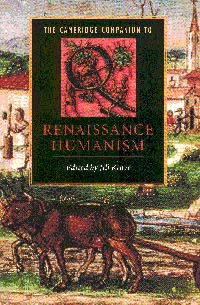Book contents
- Frontmatter
- 1 The origins of humanism
- 2 Classical scholarship
- 3 Humanism in script and print in the fifteenth century
- 4 The humanist reform of Latin and Latin teaching
- 5 Humanist rhetoric and dialectic
- 6 Humanists and the Bible
- 7 Humanism and the origins of modern political thought
- 8 Philologists and philosophers
- 9 Artists and humanists
- 10 Vernacular humanism in the sixteenth century
- 11 The new science and the traditions of humanism
- 12 Humanism and Italian literature
- 13 Humanism and English literature in the fifteenth and sixteenth centuries
- 14 Humanism and seventeenth-century English literature
- A guide to further reading in English
- Biographical index
12 - Humanism and Italian literature
Published online by Cambridge University Press: 28 May 2006
- Frontmatter
- 1 The origins of humanism
- 2 Classical scholarship
- 3 Humanism in script and print in the fifteenth century
- 4 The humanist reform of Latin and Latin teaching
- 5 Humanist rhetoric and dialectic
- 6 Humanists and the Bible
- 7 Humanism and the origins of modern political thought
- 8 Philologists and philosophers
- 9 Artists and humanists
- 10 Vernacular humanism in the sixteenth century
- 11 The new science and the traditions of humanism
- 12 Humanism and Italian literature
- 13 Humanism and English literature in the fifteenth and sixteenth centuries
- 14 Humanism and seventeenth-century English literature
- A guide to further reading in English
- Biographical index
Summary
This chapter will examine the ways in which Italian literature was influenced by the humanist movement in the crucial period in which the studia humanitatis dominated the intellectual agenda in Italy, broadly speaking from the time of Petrarch to the age of Lorenzo de' Medici. The two centuries surveyed here embrace a period which begins with the embryonic 'medieval' humanism of Dante Alighieri and terminates in the early sixteenth century, when Italian humanists ceased to form part of the mainstream of creative literature in Italy and the studia humanitatis became institutionalized in the university system.
At the outset it is important to distinguish between the classical tradition in general and the humanist movement in particular. To consider every Italian work inspired by the legacy of antiquity in this classicizing age of Italian literature is beyond the scope of this chapter and this book. Instead, I shall focus on vernacular literature in Italy which was either written by humanists or informed by humanist values.
Although Dante is not usually regarded as a humanist, the Divina commedia (c. 1307-18) presents a number of features which indicate that to a certain extent the poem derives from a humanist matrix. In a sense Dante 'discovered' the Aeneid, in that he was the first to make Virgil talk again to his age after centuries of silence. As he himself was aware, he was the first Italian writer to read the Roman poet in both a political and intertextually creative way - the latter is alluded to in Dante's famous address to Virgil when he meets him in the first canto of the whole Commedia: 'You are the single author from whom I derived the fine style which has brought me such honour' (Inferno 1.86-7).
- Type
- Chapter
- Information
- The Cambridge Companion to Renaissance Humanism , pp. 224 - 245Publisher: Cambridge University PressPrint publication year: 1996

